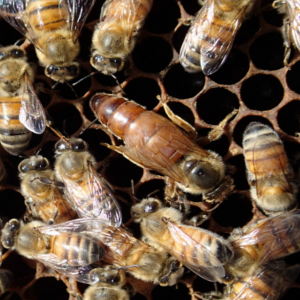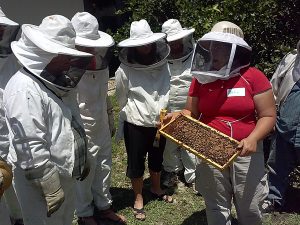For the love of Honey
Becoming a Beekeeper wasn’t something I dreamed about my whole life. Beekeeping was never on my radar. When a friend suggested I consider beekeeping, I don’t remember jumping up and down and being thrilled. One thing drove me forward; I like honey. Well, I actually love honey. It was the love of honey that pulled me in and a new found fascination of honey bees that keeps me going forward.
The incredible honey bee

Honey bees are fascinating. The workers are all female. One female, the queen, lays all of the eggs and is the mother of the whole colony. The male bees, drones, only task is to hang out together and wait for a virgin queen to fly by on her mating flight. They mate in mid-flight and if they are successful at mating, they die. After the queen mates, she will return to the hive and never mate again. While worker bees live about 45 days, the queen usually lives 2 to 3 years and lays hundreds of thousands of eggs over her lifetime. As a bee gets older, her job in the hive changes. The newly hatched bee will clean out its own cell and may become a cleaner for a couple of days. Her next job is to be a nurse bee and care and feed the baby bees. At 12 days old they can produce wax from a gland in their head so they take on the task of builder. During this time they help store food among other tasks. At 18 days old they have started practice flights and may become a guard bee. Guard bees protect the hive from invaders. The last weeks of their life is usually spent foraging for nectar and pollen. Although they collect it, other bees are put in charge of storing it in the hive. Such is the short version of a honey bees life.
So much to learn

Something I noticed about beekeepers is they usually have different ideas about how to do things. Ask a dozen beekeepers the same question about bees and you may get a dozen answers. After a while most people find what works for them; usually through a lot of trial and error. Joining a local beekeepers association is a good place to start if you want to learn about honey bees and become a beekeeper. In Highlands County, the Heartland Beekeepers Association meet at 7 PM on the third Thursday of every month at the Bert J Harris Agricultural Civic Center in Conference room 2. Beekeepers come together once a month and talk about what’s going on in their hives and what kind of treatments and approaches they take. At this September’s meeting on Thursday the 20th, they will offer a free one hour presentation “Is Beekeeping for you”. Coincidentally, the same name as this article! This free talk will be an introduction to a series of classes offered by UF/IFAS Extension, Highlands County. Click here to register for the free talk. There are a lot of rewards to keeping bees and nothing quite like having honey from your own bees.
Like my Hometown Gardener page on Facebook and stay up with the latest horticulture info in Florida’s Heartland.
Read Highlands County Extensions other blogs at https://blogs.ifas.ufl.edu/highlandsco/
Save the Date for the 2018 Garden Festival by the Highlands County Master Gardeners. November 17th at the Bert J Harris Agricultural Civic Center in Sebring, Fl. For information or to be a vendor email me at davidaustin@ufl.edu
 0
0

Comments are closed.